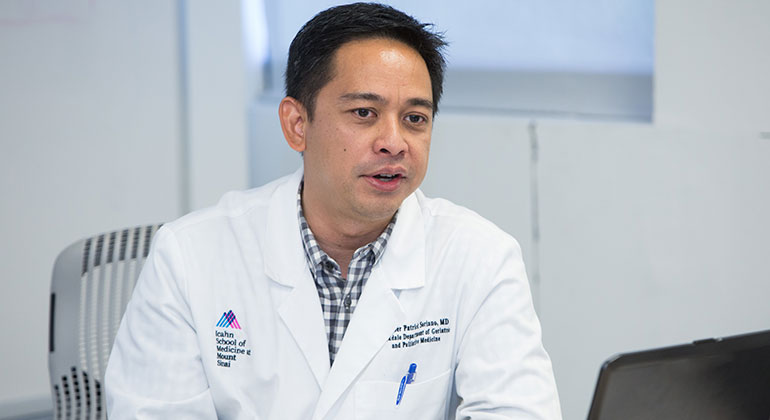Icahn School of Medicine at Mount Sinai Appoints Rainier P. Soriano, MD, as Senior Associate Dean, Curricular Affairs

After a lengthy national search, the Icahn School of Medicine at Mount Sinai has appointed Rainier P. Soriano, MD, as Senior Associate Dean for Curricular Affairs in Medical Education.
Board certified in Geriatric Medicine, Dr. Soriano is a tenured professor in Geriatrics and Palliative Medicine, Medicine, and Medical Education at Icahn Mount Sinai. He has had a distinguished career as both an educator and a physician, twice receiving the Excellence in Teaching Award from the Institute for Medical Education (IME), in 2003 and 2009. Other distinctions include the Alpha Omega Alpha Medical Honor Society and the Gold Humanism Award.
“Rainier Soriano has all the ingredients of a great educator: he is an insightful and engaging teacher; he is beloved by students and puts their learning needs above all else; he is a fabulous research and career mentor; he has a sophisticated knowledge of technology and its impact on education; and he is visionary, with exciting ideas about what and how we need to teach today in anticipation of how we will practice medicine tomorrow,” says David Muller, MD, FACP, Dean for Medical Education, Icahn Mount Sinai.
Addressing the problem of racism and bias will be front and center in redesigning the curriculum, says Dr. Soriano, noting that up until very recently it has been a sideline issue. “The curriculum needs to be tuned into how racism and bias play a significant role in health care delivery. We need to weave conversations about racism more intentionally into our instruction. I’d like our educators to open their respective courses with a discussion of how race informed the medical knowledge within the field and how it continues to permeate health care delivery instead of mentioning it as an aside, midway through the course. This will change the emphasis and the dialogue,” says Dr. Soriano.
Dr. Soriano came to the United States after receiving his MD from the University of Santo Tomas in the Philippines. He completed his residency and chief residency in Internal Medicine (Primary Care) at Englewood Hospital in Englewood, New Jersey, which was a Mount Sinai training program at that time. He joined The Mount Sinai Hospital for his Geriatrics fellowship, and also served as Chief Fellow.
Dr. Soriano’s experience in medical education is extensive. He was the Co-Director of the Medicine-Geriatrics Clerkship from 1999-2006; directed the Art & Science of Medicine Course from 2004-2014; has been Co-Director of the Curriculum and Director of Education Technology for the last 10 years, and was promoted to Associate Dean of Curriculum and Clinical Competence in 2019. Dr. Soriano has directed the Medical Student Training in Aging Research Program at Icahn Mount Sinai, and recently received a five-year T35 grant from the National Institute on Aging, establishing it as one of eight National Training Centers for the program. He is the editor and co-author of the leading textbook in physical diagnosis, Bates’ Guide to Physical Examination and History Taking, and also served as the Associate Editor for Geriatrics for MedEdPORTAL: The Journal of Teaching and Learning Resources of the AAMC.
“We know that our students are more ‘woke’ than their older educators, myself included, on many important issues, including racism. We need a re-emphasis in our curriculum, not only on racism, but also of emerging topics such as genomic medicine, leadership, entrepreneurship, and artificial intelligence/machine learning, so that educators and faculty can update their practices, which may be outdated, to better serve their patients,” says Dr. Soriano.
Student wellness will continue to be of great importance. “Medical school is hard. We can’t make it less hard, but we can design our curriculum to have built-in natural pauses for students to decompress, to reflect on their wellness, and to engage with faculty and other students if they need support,” says Dr. Soriano.
About the Mount Sinai Health System
Mount Sinai Health System is one of the largest academic medical systems in the New York metro area, with more than 43,000 employees working across eight hospitals, over 400 outpatient practices, nearly 300 labs, a school of nursing, and a leading school of medicine and graduate education. Mount Sinai advances health for all people, everywhere, by taking on the most complex health care challenges of our time — discovering and applying new scientific learning and knowledge; developing safer, more effective treatments; educating the next generation of medical leaders and innovators; and supporting local communities by delivering high-quality care to all who need it.
Through the integration of its hospitals, labs, and schools, Mount Sinai offers comprehensive health care solutions from birth through geriatrics, leveraging innovative approaches such as artificial intelligence and informatics while keeping patients’ medical and emotional needs at the center of all treatment. The Health System includes approximately 7,300 primary and specialty care physicians; 13 joint-venture outpatient surgery centers throughout the five boroughs of New York City, Westchester, Long Island, and Florida; and more than 30 affiliated community health centers. We are consistently ranked by U.S. News & World Report's Best Hospitals, receiving high "Honor Roll" status, and are highly ranked: No. 1 in Geriatrics and top 20 in Cardiology/Heart Surgery, Diabetes/Endocrinology, Gastroenterology/GI Surgery, Neurology/Neurosurgery, Orthopedics, Pulmonology/Lung Surgery, Rehabilitation, and Urology. New York Eye and Ear Infirmary of Mount Sinai is ranked No. 12 in Ophthalmology. U.S. News & World Report’s “Best Children’s Hospitals” ranks Mount Sinai Kravis Children's Hospital among the country’s best in several pediatric specialties.
For more information, visit https://www.mountsinai.org or find Mount Sinai on Facebook, Twitter and YouTube.